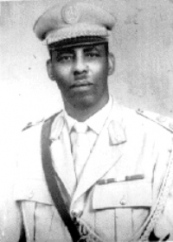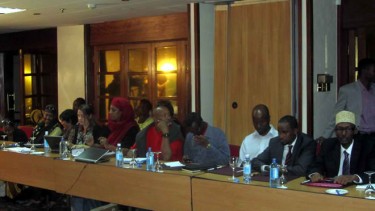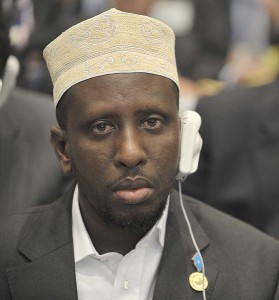Somalia has not had a central government controlling the entire country since the fall of Muhammad Siad Barre in 1991. The Transitional Federal Government (TFG) is the internationally recognized government of the Republic of Somalia.
After political discussions in Ethiopian, leaders of various Somali parties agreed to political steps to end the transitional period and elect a new president. One of the steps outlined in a detailed timetable is the drafting of a new constitution.
Technical Revision Committee for the new constitution participated in a 4-day working session in Nairobi:

Military portrait of Major General Mohamed Siad Barre, Somalia's longest-serving President. Source: U.S. Library of Congress (Public Domain)
A four-day working session with the Signatories’ Technical Revision Committee has been concluded in Nairobi. The working session is a follow up to the recent Addis Signatories’ meeting were most of the constitutional issues were agreed and some of the provisions – prepared by the Independent Federal Constitution Commission – have been amended after congenial political negotiations between the signatories of the Roadmap to end the transition, which was adopted in Mogadishu last September. The technical Revision Committee’s mandate as per Addis Ababa’s Communiqué is to complete the constitutional process.
The Minister of Constitutional Affairs who convened the meeting explained to the participants and the media that “that road towards ending of the transition is getting closer and closer by the day, and we need to collectively work towards delivering a constitution that Somalia deserves and which serves its people.

Members of the Technical Revision Committee in Nairobi. Photo courtesy of http://horn.so/
Mahad Abdalle Awad, Deputy-Minister Ministry of Planning International Cooperation in Somalia, is optimistic that the country will soon have a new constitution:
Fearmongers use scare tactics to influence public opinion to impede change and progress by disseminating false information about the draft constitution and the planned Constituent Assembly meeting. Naysayers, natural skeptics and cynical people among us, habitually express negativity about the accomplishment of others and are pessimistic about change. Dale Carnegie’s famous quote fittingly describes the nature of Naysayers when he wrote “Any fool can criticize, condemn and complain, and most fools do.”
These Naysayers often spread blatant lies to oppose anything other people do. In the case of the Constituent Assembly, they assert that the constitution can only be approved by popular referendum, disregarding discernible historical fact that the Somali Republic itself was founded by the 1960 Constitution, approved by Constituent Assembly of only 110 delegates, and a process that took only 29 days, whereby public referendum was held 21st of July 1961, after more than one year.
However, Mohamed Ali Hassan, Chairman of the Somali-American Peace Council and Manuela Melandri, PhD candidate at University College London, note that most Somalis look at the draft constitution with deep skepticism:
The optimism of the international community is not shared by Somalis themselves, who instead look with deep skepticism at a document that they perceive as externally-imposed, faulty and fundamentally undemocratic.
To understand this dynamic, one should start by questioning the facts. What is wrong with the new Somali Constitution and why has the adoption of this document been met with resistance by educated Somalis, religious figures, secularists, former Somali Prime Ministers, women, scholars and by Somali Diaspora organizations?
First, there are issues concerning the content of the Constitution and the substance of its provisions.
Above all, the question of federalism remains deeply divisive. Views can be found both in support of and against Somalia adopting a federal structure.

Somali President Sharif Sheikh in Addis Ababa, Ethiopia, during the 12th African Union Summit Feb. 2, 2009. Source: U.S. federal government (Public Domain
But one Somali argue that the new constitution can be improved in the future. Somalis do not have time to wait for a a perfect constitution:
Whether we like it or not, when we see images of the Somali people around the world and we compare our own situation (at least, those in the Diaspora that live in peace), do we feel that those brothers and sisters need a constitution that works for them now since they are dealing with horrible situations? Think about this: maxay ku gaaraan mustaqbalka?
You have to know that I did not write those news articles mentioned above, Iam not part of the group that put together of the new constitution and I am not here to justify whether the new constitution is good, bad or ugly. All I want to remind you is that: those that are in need may not have time to wait a new perfect and pretty constitution; they need one that works for them for the time being. More importantly, I am not here to oppose anyone’s idea – I am just expressing my own views as anyone else. However, the best solution that I see, at least in my opinion, let us commence discussing how to improve the new constitutions in the future.
Mohamud Uluso considers the draft constitution “a hurried job, with the latest version available only in Somali language while various outdated or fake versions are circulating on the web”:
It appears that the UN-wise roadmap for Somalia is nothing but part of a plan of perfidy to keep Somalia and the Somalis in turmoil. Instead of liberating the true Somalis, who need and want to continue living in and developing their own country and their communities inside Somalia, the planned constitution appears as the manifestation of the shackles of foreign as well as internal oppression of the indigenous Somali people in perpetuity.
—
Most Somalis and their scholars doubt that it is the right time to engage in the process of forming a new constitution during an era of civil strife and turmoil in Somalia and wonder why millions of dollars have been spent by the players from the so-called international community to re-invent the wheel, while the existing Somali constitution could just be amended if any real need would be given and legally as well as representatively expressed – reflecting the true and free will of the Somali people.
—
According to insiders FGM [Transitional Federal Government] is now permitted by the newly proposed Somali constitution, which will be presented for adoption to selected “traditional leaders”. A typical scheme how the UN and their stooges want to get it their way – or the way their master wants it.
Abduallhi Jamaa analyses various arguments about the draft constitution appearing online, vernacular radios and in village meetings and cafes:
Analysts say the proposed law is seemingly a milestone, but one that may fracture Somalia further into autonomous and semi-autonomous regions as well as ministates.
—-“There is absolute confusion. There wasn’t any civic education to put across the letter and spirit of the proposed laws and this means that most people are not comfortable with the contents, many more have not heard about the whole process,” he [Hassan Sheikh, the leader of the Party of Peace and Development] told Somalia Report.
—
Amongst the contentious issues include the proposed model of government, the controversial issue of natural resources and the religious influence. Some players argue that the language of the draft is not understandable, an issue that can lead to various kinds of misinterpretation.—-
“The issue isn't just about the dispute over the contents. It is related to an absence of public representation. I do not wish to be part of a constituent assembly that does not represent Somalia’s vision and mission,” said traditional elder Mohamed Hersi.
Google Ideas developed a pilot project with the Somali service, Africa Division of Voice of America (VOA) to help Somalis register their opinions with just a few clicks. The poll shows, among other things, that Somalis want a Somalia based on the civil and criminal codes of Sharia, a strong central government and are divided over the inclusion of women in government.






